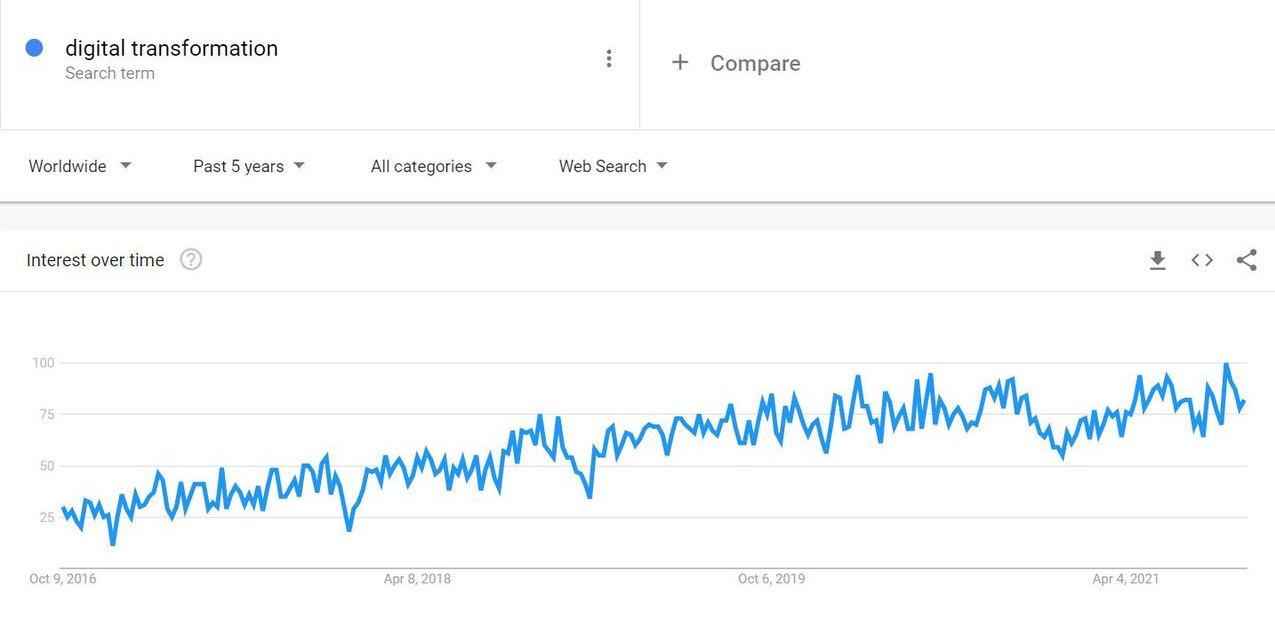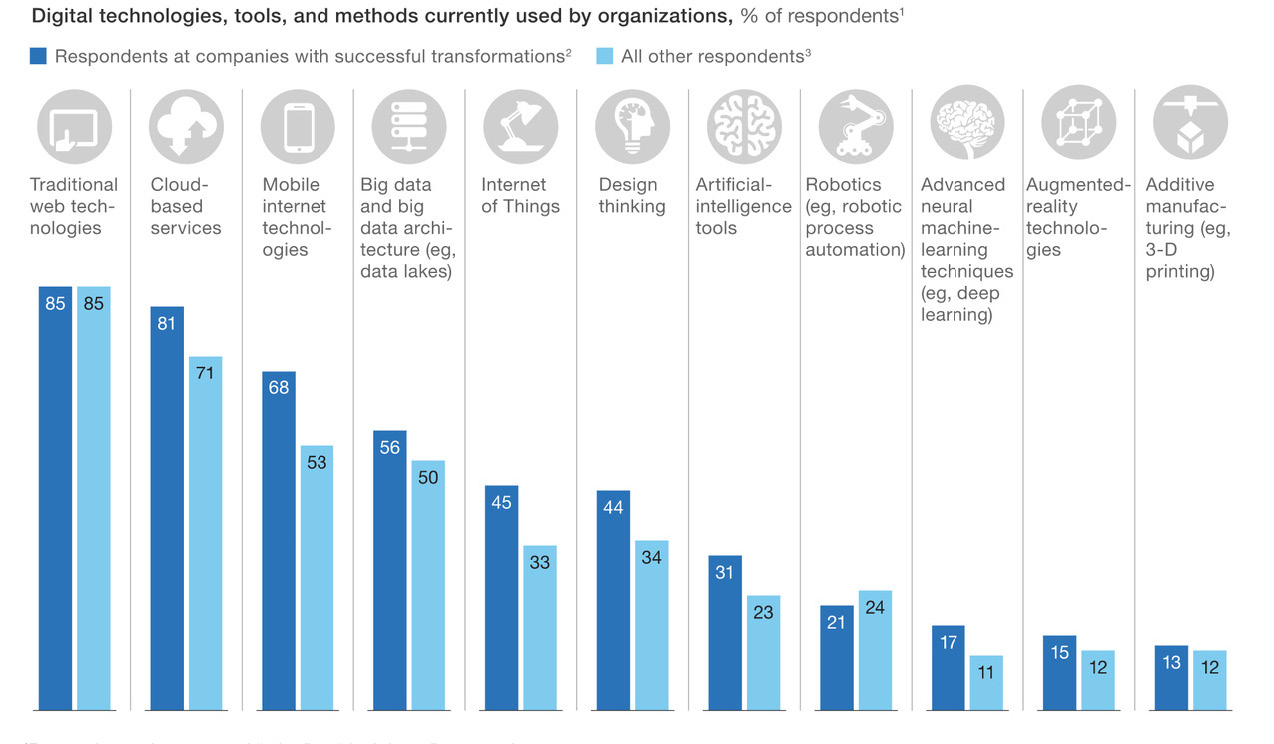Guide to Humanizing Digital Transformation
The power of content to deliver meaningful customer experiences and growth

A digital approach for businesses is no longer a “nice to have.” As more and more customers demand engaging digital experiences with brands, organizations must keep pace, or die.
It’s no wonder that the keyword “digital transformation” in Google Trends has been trending upward over the past five years:

Digital transformation, however, can require significant time and budget. According to Gartner, “the transformation journey is taking large enterprises especially at least twice as long and costing twice as much as they originally anticipated.” Nonetheless, more and more businesses are prioritizing digital, knowing that 80% of buyers today research a company online before actually contacting them or making a purchase.
Through content, brands create a digital persona that is essential to these digital customer experiences. Content is how businesses build trust with audiences in the digital age—providing valuable content to the right people at the right time. And with a data-informed content strategy, brands can track and evolve these interactions.
What is digital transformation?
Digital transformation refers to a company’s transition to supporting more business functions with technology. A particularly important facet is the application of digital marketing to a growing audience of consumers online. Technology allows you to connect digitally with customers, before the sale all the way through the customer lifecycle.
Digital transformation accelerated industry-wide over 2020– 2021, requiring organizational leaders to get on board to stay competitive. Successful digital transformation can involve many areas with varying applications, as this illustration of a McKinsey study details:

Accordingly, digital transformation spans the entirety of an organization, across job functions and from day-to-day tactics to longer-term strategy.

Examples of digital transformation are everywhere—from simple online brochures to ecommerce to AI-powered chatbots.
“Content is modern marketing and now content is everyone’s job.”
—Hayley Nelson, VP of Content, Salesforce
Take, for example, WordPress VIP customer Al Jazeera. In partnership with more than 70 international bureaus, the
media network delivers content 24/7 across 10 channels and divisions. With a vision of leveraging these global newsrooms to offer innovative new perspectives and experiences, Al Jazeera developed an app that lets users compare different perspectives on the world’s important stories, no matter the origin or language.
It’s a classic case study in humanizing digital transformation, even if users “just want the news.”
Creating meaningful customer experiences in a digital-first world
Digital transformation isn’t just about switching to digital methods of communication with potential customers. It’s about facilitating meaningful customer experiences. Digital is where you can do that.
“… brands that create great digital experiences fuel great customer experiences that add to the bottom line.”
— The Forrester Wave: Agile Content Management Systems (CMSes) Q1 2021
Craftpeak, as an example, is a company all about building awesome tech-driven web experiences as specialized as their craft brewery clients.
“We use technology to point people to those products, and ultimately what we’re trying to do is connect the story closer to the transaction,” said Craftpeak CEO John Kelley. “It’s an opportunity for businesses to differentiate themselves by the experiences they’re creating online. What is the ultimate customer experience you’re trying to create and how do you leverage technology to do that?” (Hear more from John in our on-demand webinar Drive Digital Commerce With Content Marketing.)
Content is essential to this customer-centric view of digital transformation, as a customer’s experience with a brand is
a digital experience. “Businesses can’t operate the way that they used to,” said Mallory Russell, Head of Content at Square. “Everything has to be content.”
Content is essential to digital customer experiences
Digital customer experiences would be bleak without content. Content builds trust with prospective customers, proves a brand’s expertise, and drives revenue.
Consider how the global COVID-19 crisis forced the 2020 Democratic National Convention Committee to go completely online. They had to answer questions like, “How do you make people feel really excited about this moment when it’s virtual? How do we make a balloon drop from home?”
In the end, the event attracted a record 122 million viewers.
“The website basically became the convention. We had 15 different ways folks could watch the live stream, whether it was on your Apple TV or your Amazon Echo or our YouTube page, which was also embedded on the website.”
—Hannah Flom, Director of Digital Communications, DNCC
To facilitate dynamic content experiences like these, companies must carefully consider the content management system (CMS) they choose. Without a flexible platform that democratizes content creation and publishing, even businesses committed to digital transformation will find themselves outpaced and behind, scrambling in constant catch-up, patching code, and taking too long to go to market.
Because content is the propelling force behind the customer journey, investing in the means by which you serve up these experiences will allow your company to iterate intelligently on content now and for years to come.
Power lasting content success through data-informed, iterative customer experiences
Data-informed content strategy is the final piece of an effective content machine. To stay competitive and ensure success with content experiences, insight into how that content is performing is essential to inform your digital content strategy.
Investing in technology like WordPress VIP’s built-in content analytics and optimization augments the digital impact of a brand, accelerating digital transformation. Analytics empower teams to evaluate if their digital transformation approach and content are working. And if they’re not, data-driven insights can pinpoint where to make adjustments.
“We needed a piece of technology that would force a reckoning to learn what digital marketing means today.”
— Parker Ward, Global Head of Digital Content, Capgemini
Simply put, digital transformation can’t work its magic without content analytics to intelligently inform future decisions.
An agile CMS enables lasting digital transformation
Digital transformation requires brands to rapidly and continually innovate.
When most customer experiences are now digital, it’s critical
for brands to provide exceptional customer experiences
online. Gone are the days of “duping” or “charming” audiences, especially with today’s critical, digital-savvy customers. To build customer trust, it comes down to providing helpful information— i.e., content—at the right time to the right people.
Your content management system (CMS) is the link between digital and content—a key force in driving customer-centricity and humanized experiences. To spur the rapid innovation necessary in digital transformation, your CMS must facilitate:
- Collaboration across functions and departments—so content creators and developers alike can combine efforts and expertise in a single solution.
- Getting digital experiences to market faster—across channels and campaigns.
- Becoming insights-driven to propel higher content performance—by gaining insight and visibility into your audience, engagement, and how content impacts your KPIs.
“Is CMS still relevant? Is CMS still important? Yes, absolutely, because that is the way that brands deliver their digital persona on all of the channels that they do business in. Still incredibly, incredibly important.”
— Nick Barber, Senior Analyst, Forrester
In conclusion
To be successful, digital transformation must be customer- centric. And content—the connection customers have with your brand—is essential to the digital customer experience. Simply put, being able to quickly deploy engaging digital experiences to your audience, measure what’s working, and have confidence in the underlying platform are key requirements to business growth through content.
An agile, enterprise-ready platform, WordPress VIP delivers core solutions in content management, enterprise commerce, and content analytics and optimization. Tell us more about your upcoming project.